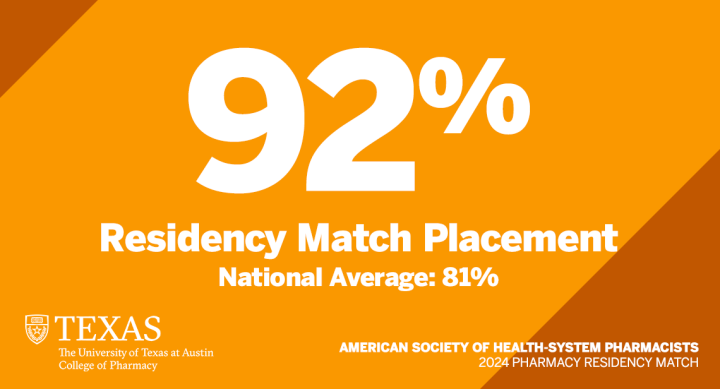
Pharmacy schools across the country completed their 2024 Phase I and Phase II residency matches for new or upcoming graduates of their Doctor of Pharmacy (Pharm.D.) programs. The University of Texas at Austin College of Pharmacy exceeded its previous match rate for pharmacy residencies.
“We are delighted to continually place our Pharm.D. graduates into highly competitive and challenging residencies year after year,” said Dr. Diane Ginsburg, Associate Dean for Healthcare Partnerships. “Watching our placement rates maintain or rise every year makes me proud for our sought-after and skilled graduates."
According to the American Society of Health-System Pharmacists's 2024 Pharmacy Residency Match results, The University of Texas at Austin College of Pharmacy placed 92% of its upcoming graduates, compared to the national match placement average of 81%.
Placements include postgraduate residencies in institutions such as the the Johns Hopkins Hospital, the University of Texas MD Anderson Cancer Center, Texas Children's Hospital and many more.
The UT College of Pharmacy, in conjunction with facilities throughout Texas and beyond, provides a variety of outstanding Postgraduate Year One (PGY1) and Postgraduate Year Two (PGY2) Practice Residencies in Pharmacy Practice, Community-based Practice, Ambulatory Care, Internal Medicine and many more. The residency process is important to providing additional education and experience in the pharmacy profession and assures good career footing for UT Pharmacy graduates at the start of their careers.
Residency match rates are one of many indicators demonstrating the quality of a pharmacy education and the institution-wide support system that program includes. Many other talented Pharm.D. graduates choose other career paths with their degrees aside from residency, often joining the workforce directly and pursuing a direct path into community pharmacy or other opportunities.

